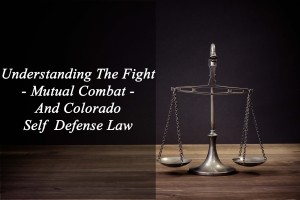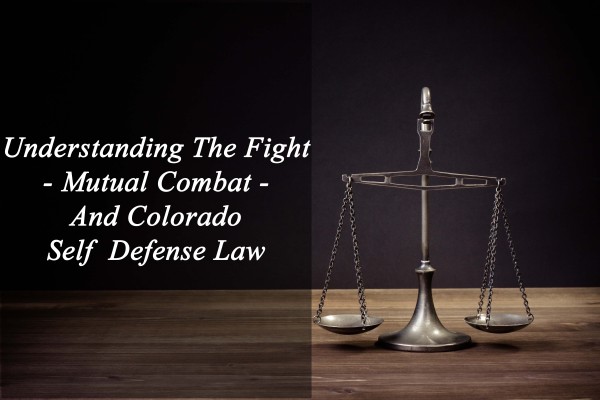





Understanding The Fight – Mutual Combat – And Colorado Self Defense Law
By H. Michael Steinberg Colorado Criminal Defense Lawyer For Self Defense
 Understanding The Fight – Mutual Combat – And Colorado Self Defense Law – Colorado law provides for the affirmative defense of self defense only under certain conditions. One of the exceptions to successfully asserting the defense of self defense in a fight – is called the MUTUAL COMBAT EXCEPTION.
Understanding The Fight – Mutual Combat – And Colorado Self Defense Law – Colorado law provides for the affirmative defense of self defense only under certain conditions. One of the exceptions to successfully asserting the defense of self defense in a fight – is called the MUTUAL COMBAT EXCEPTION.
What follows is the foundational statute in Colorado that addresses self defense – pay attention to subsection 2 – C:
18-1-704 Use Of Physical Force In Defense Of A Person
1. Except as provided in subsections (2) and (3) of this section, a person is justified in using physical force upon another person in order to defend himself or a third person in order to defend himself or a third person from what he reasonably believes to be the use or imminent use of unlawful physical force by that other person, and he may use a degree of force which he reasonably believes to be necessary for that purpose.
2. Deadly physical force may be used only if a person reasonably believes a lesser degree of force is inadequate and:
(a.) The actor has reasonable ground to believe, and does believe, that he or another person is in imminent danger of being killed or of receiving great bodily injury; or
(b.) The other person is using or reasonably appears about to use physical force against an occupant of a dwelling or business establishment while committing or attempting to commit burglary as defined in sections 18-4-202 to 18-4-204; or
(c.) The other person is committing or reasonably appears about to commit kidnapping as defined in section 18-3-301 or 18-3-302, robbery as defined in section 18-4-301 or 18-4-302, sexual assault as set forth in section 18-3-402 or 18-3-403 as it existed prior to July 1, 2000, or assault as defined in sections 18-3-202 or 18-3-203.
3. Notwithstanding the provisions of subsection (1) of this section, a person is not justified in using physical force if:
(a.) With intent to cause bodily injury or death to another person, he provokes the use of unlawful physical force by that other person; or
(b.) He is the initial aggressor, except that his use of physical force upon another person under the circumstances is justifiable if he withdraws from the encounter and effectively communicates to the other person his intent to do so, but the latter nevertheless continues or threatens the use of unlawful physical force; or
(c.) The physical force involved is the product of a combat by agreement not specifically
authorized by law
(4) In a case in which the defendant is not entitled to a jury instruction regarding self-defense as an affirmative defense, the court shall allow the defendant to present evidence, when relevant, that he or she was acting in self-defense. If the defendant presents evidence of self-defense, the court shall instruct the jury with a self-defense law instruction. The court shall instruct the jury that it may consider the evidence of self-defense in determining whether the defendant acted recklessly, with extreme indifference, or in a criminally negligent manner. However, the self-defense law instruction shall not be an affirmative defense instruction and the prosecuting attorney shall not have the burden of disproving self-defense. This section shall not apply to strict liability crimes.
How Can I Understand The Parameters Of The Mutual Combat Exception To The Self Defense Law In Colorado?
Bottom line – Sub Section 18-1-704(3)(c), C.R.S. clearly provides that, in Colorado, a person is not justified in using self-defense if:
“[t]he physical force involved is the product of a combat by agreement not specifically authorized by law.”
Unfortunately, as is often the case in criminal law statutes, this law never defines the term “combat by agreement.” When that happens – it is left to the Colorado Courts of Appeal to interpret what that phrase means
The “elements” of what constitutes mutual combat have been defined in Colorado cases over the years.
Before you can be denied the right to assert self defense under the Mutual Combat exception there must be a “ definite agreement” between the parties .. to fight!
Some Rules Taken From Colorado Cases Dealing With Mutual Combat
Mutual combat does not exist purely because the parties were mutually engaged in a fist fight.
To prove the mutual combat exception, the State must prove that an agreement to fight existed between the parties, and that the parties entered into the agreement before beginning combat.
Example: The alleged victim in a criminal case initially attacks a Defendant in the bathroom of a pool hall. An argument ensues with the victim threatening the defendant and both men pushing each other. Bartender says – of course – “take the fight outside.” Alleged victim then said, “Let’s go outside,” to the defendant. They take off their coats – go outside and the victim takes the first poke at the Defendant. The Defendant then hits the alleged victim so hard – he kills him.
Held: Because there was no “clear-cut agreement” to fight, there is mo mutual combat. While some of the facts support an agreement (taking off the coats and going outside) – the law requires a “more definite agreement” following facts that support some kind of initial aggression in situations such as this one.
But – in cases where there is a history of previous altercations and a clear intent to engage in conflict the result could be different.
In all cases, however, just like a civil contract between the parties:
….there must be a clear invitation to fight followed by an acceptance, verbal or otherwise…. an “agreement per se.”
A Trial Judge cannot legally take away the right to assert self defense based upon mutual combat unless the evidence supports a conclusion that the parties agreed to fight and that the parties entered into the agreement before beginning combat. When there is a “general follow-up of aggression,” and a fight ensues – that does NOT MEAN this is an agreement to fight by mutual combat.
Remember – unless there is a clear agreement to fight can be gleaned from the evidence, a Trial Court should not instruct the jury on the mutual combat exception to self-defense and take away that right.
Understanding The Fight – Mutual Combat – And Colorado Self Defense Law
If you found any of the information I have provided on this web page article helpful please click my Plus+1 or the Share buttons for Twitter and Facebook below so that others may also find it.
If, after reading this article, you have questions about your case and would like to consider retaining our law firm, we invite you to contact us at the Steinberg Colorado Criminal Defense Law Firm – 303-627-7777.
Never stop fighting – never stop believing in yourself and your right to due process of law.
ABOUT THE AUTHOR: H. Michael Steinberg – Email The Author at [email protected] – A Denver Colorado Criminal Defense Lawyer – or call his office at 303-627-7777 during business hours – or call his cell if you cannot wait and need his immediate assistance – 720-220-2277. Attorney H. Michael Steinberg is passionate about criminal defense. His extensive knowledge and experience of Colorado Criminal Law gives him the edge you need to properly handle your case.
“A good criminal defense lawyer is someone who devotes themselves to their client’s case from beginning to end, always realizing that this case is the most important thing in that client’s life.”
 You should be careful to make a responsible choice in selecting a Colorado Criminal Defense Lawyer – and we encourage you to “vet” our firm. Over the last 30 plus years – by focusing ONLY on Colorado criminal law – H. Michael has had the necessary time to commit to the task of constantly updating himself on nearly every area of criminal law, to include Colorado criminal law and procedure and trial and courtroom practice. H. Michael works hard to get his clients the best possible results in and out of the courtroom. He has written, and continues to write, extensively on Colorado criminal law and he hopes this article helps you in some small way – Understanding The Fight – Mutual Combat – And Colorado Self Defense Law.
You should be careful to make a responsible choice in selecting a Colorado Criminal Defense Lawyer – and we encourage you to “vet” our firm. Over the last 30 plus years – by focusing ONLY on Colorado criminal law – H. Michael has had the necessary time to commit to the task of constantly updating himself on nearly every area of criminal law, to include Colorado criminal law and procedure and trial and courtroom practice. H. Michael works hard to get his clients the best possible results in and out of the courtroom. He has written, and continues to write, extensively on Colorado criminal law and he hopes this article helps you in some small way – Understanding The Fight – Mutual Combat – And Colorado Self Defense Law.

More Information:
- Colorado Self Defense Law – When Innocent Third Parties Are Injured
- Self Defense Law In Colorado 18-1-704 – Do I Have To Run? – The Duty To Retreat Issue












